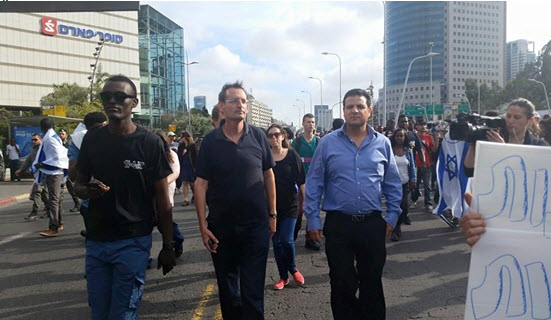What began as a peaceful protest turned into bedlam in the heart of Tel Aviv Sunday, May 3, as demonstrators gathered to protest police brutality and institutional racism against Israel’s Ethiopian population. A video released last week showed a police officer and a police volunteer assaulting an Ethiopian-Israeli soldier in Holon. That footage sparked a demonstration in Jerusalem Thursday, April 30, and again in Tel Aviv on Sunday night.

Among the protesters in Tel-Aviv, on Sunday, May 4, two MKs from Hadash, the chair of the Joint List, Ayman Odeh, right, and a member of the Political Bureau of the Communist Party of Israel, Dov Khenin. (Photo: Al Ittihad)
At Sunday’s demonstration, protesters threw rocks and glass bottles at police, who responded with stun grenades and water cannon. As of midnight, Sunday, more than 50 people had been injured. According to the spokesman for the Israel Police Force, Micky Rosenfeld, 23 of the injured were police officers. By the end of the night, 26 protesters were under arrest.
As more and more people arrived at the normally busy intersection where the protesters first gathered, the intensity of the commotion increased. Police formed a human chain, locking arms to prevent protesters from crossing Menachem Begin Road and heading eastward to Ammunition Hill Street. Restless demonstrators interpreted this as a challenge, and began to square off and make contact with the police. The protesters shouted at the regular police officers and then at the Border Police who had arrived as reinforcements. After more aimless struggling with the police on Ammunition Hill Street, the protest eventually headed west down Kaplan Street towards Rabin Square, where the protest was planned to continue in a rally. People chanted in Hebrew, “Violent police officers should be locked up!” “Bibi [PM Benjamin Netanyahu) go home!” and “For blacks and whites, racism is the devil.” Sometimes the shouts were simpler: “Police state” and “No to racism!” some shouted. Among the protesters were two MKs from Hadash, the chair of the Joint List, Ayman Odeh, and a member of the Political Bureau of the Communist Party of Israel, Dov Khenin.
At a little after 9:00 pm the first stun grenades were tossed in Rabin Square. This set off the first of many rounds of escalation which eventually developed into a out-and-out brawl. Over and again, police and protesters would clash on the east side of Rabin Square. The two sides would push and shove one another until someone – from either side – would push too hard. Police then responded with stun grenades. To this, the protesters replied by throwing bottles and rocks. By midnight, the protest began to wind down, leaving Rabin Square – named for an assassinated prime minister and symbolizing, perhaps, deep schisms in Israeli society – full of broken glass, shards of stun grenades, rocks, and burned garbage.
Joint List chairman MK Ayman Odeh made the connection between the various struggles against police violence directed at specific social or ethnic groups in Israel. “As a member of the Arab population, which suffers from racism and violence by the police, it was only natural for me to join the protest by the Ethiopian population today in Tel Aviv,” Odeh said in a statement. “I promise to stand by their side in their struggle until there is a more equal and just society here; in which there is no difference between black and white, man and woman, Jew and Arab.”
As indicated above, the first mass protest in Jerusalem last Thursday, April 30, was triggered by the video released earlier in the week of an Ethiopian Israeli soldier in uniform being beaten by an Israel Police officer and police volunteer in Holon. On Thursday night, around 1,000 Ethiopian Israelis began rallying outside Israel Police headquarters in the capital, eventually blocking traffic at a number of intersections in the city. Police used tear gas to clear the crowd, and in the ensuing fracas, three policemen and more than ten protesters were injured and received medical treatment.
Later Thursday night, MK Odeh posted on his Facebook page: “As an Arab citizen, I am very familiar with the feeling of standing in a demonstration in front of a police officer whose eyes are blinded by racism”. According to MK Odeh “I can imagine what the Ethiopian youths felt as they were protesting, when the police began to beat them, fire tear gas, and arrest them.” Directly addressing the Ethiopian community, Odeh wrote: “The struggle for a truly democratic and equitable society, without discrimination of any kind, this is your struggle and our struggle.”


